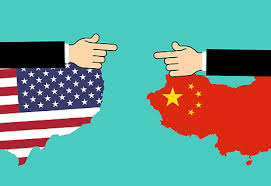
U.S. President Donald Trump has accused China of covering up the corona virus - suggesting that the government has allowed the disease to spread and threatened to pay Beijing a "significant price" for the pandemic. The US government's decision to step up China's role in the corona virus pandemics has alarmed national security experts, who fear that a new Cold War is brewing between the two superpowers at a moment of global crisis.
Odell and others say the consequences could be far-reaching - prolonging the pandemic, deepening the global economic crisis, jeopardizing delicate trade talks, and opening a new geopolitical rift. COVID-19 Pandemics have shifted from an unexpected and potentially fateful turn to the United States and China.
While the virus has killed thousands of people worldwide and wreaked economic havoc, the representatives of the two superpowers are blaming each other and diverting attention from their own missteps. The pandemic has strengthened hardliners in both countries, and the resulting political pressure has made it difficult for political leaders to refrain from escalation.
President Trump referred to the novel coronavirus as the "Chinese virus," or Wuhan virus, after the city that was the original epicenter of the outbreak. The term "Wuhans virus" was used to refer to blaming the ruling Chinese Communist Party for mishandling the new disease.
After the Wuhan outbreak, the CDC and the World Health Organization reported COVID-19 infections in the United States. Since then, neither the CDC nor the World Health Organization have reported any of their infections outside the United States. Trump spoke of the "Chinese virus," though the president admitted he dropped the term himself after Beijing's ambassador to Washington, Cui Tiankai, distanced himself from the unsubstantiated theory that the virus originated in China.
While China's economic growth is likely to be affected by the projected COVID-19 losses, Beijing retains considerable influence in Russia, whose country has reported only about 840 cases. After Chinese President Xi Jinping announced that China would provide $2 billion to respond to the outbreak and its economic consequences, Azar said the US had allocated $9 billion to efforts to contain the coronavirus around the world.
Tedros said he would launch an independent evaluation of the response, alluding to the findings to be published in a report by a supervisory and advisory body mandated by the WHO to review the response. The 11-page report raised questions about whether the US government's initial response to warn the world of the outbreak was appropriate, and suggested that member states may need to reassess whether there is a role for providing travel advice to countries.
China's foreign ministry said that the United States had not helped contain the outbreak of the coronavirus, which began in the city of Wuhan and spread fear rather than imposing a travel ban.
The State Department issued a travel warning advising Americans not to travel to China because of the virus. President Donald Trump called the outbreak a public health emergency requiring a ban on all Americans entering the United States and a temporary ban on all US travelers who have recently visited parts of China linked to the outbreak.
In an April 29 interview with NBC News, Le accused the Trump administration of doing nothing to imprison China as the epicenter of the coronavirus and warn of its deadly spread. Yong Wang, who heads a Center for American Studies at Beijing University, said the Trump administration's relentless rhetoric blaming China for the outbreak risked a new Cold War. Wang believes Trump's accusations against China are part of an attempt to distract from his administration's role in US-China relations.
President Donald Trump has ramped up the pressure with tariffs and trade war rhetoric since taking office in 2017, among other things. Trump has seen his poll numbers decline in recent weeks, with Biden leading narrowly in several battleground states. This has created the conditions for mutual distress in the run-up to the November 2016 presidential election and the 2018 midterm elections.
The negative view of China continues to grow, according to a new Pew Research Center survey of 1,000 US adults in March. About two-thirds now say they have a negative view of China, the highest level since the center began asking the question in 2005. One of the core messages is that China is a strong global health leader and the United States is its weakest ally. According to the survey, negative views of both the US and China in general among US adults are also at historically low levels.
In an interview, the ambassador refused to explain why a Chinese foreign ministry spokesman was promoting the idea that the US was responsible for the virus. Lea Gabrielle, who heads the GEC, told POLITICO that China has also spread "Russian propaganda efforts against the United States" in its country, where the Beijing government's Internet censorship is notoriously relentless. A spokesman for the Chinese Embassy referred to a statement by the Chinese Foreign Ministry spokesman on the subject of "Coronavirus USA."
